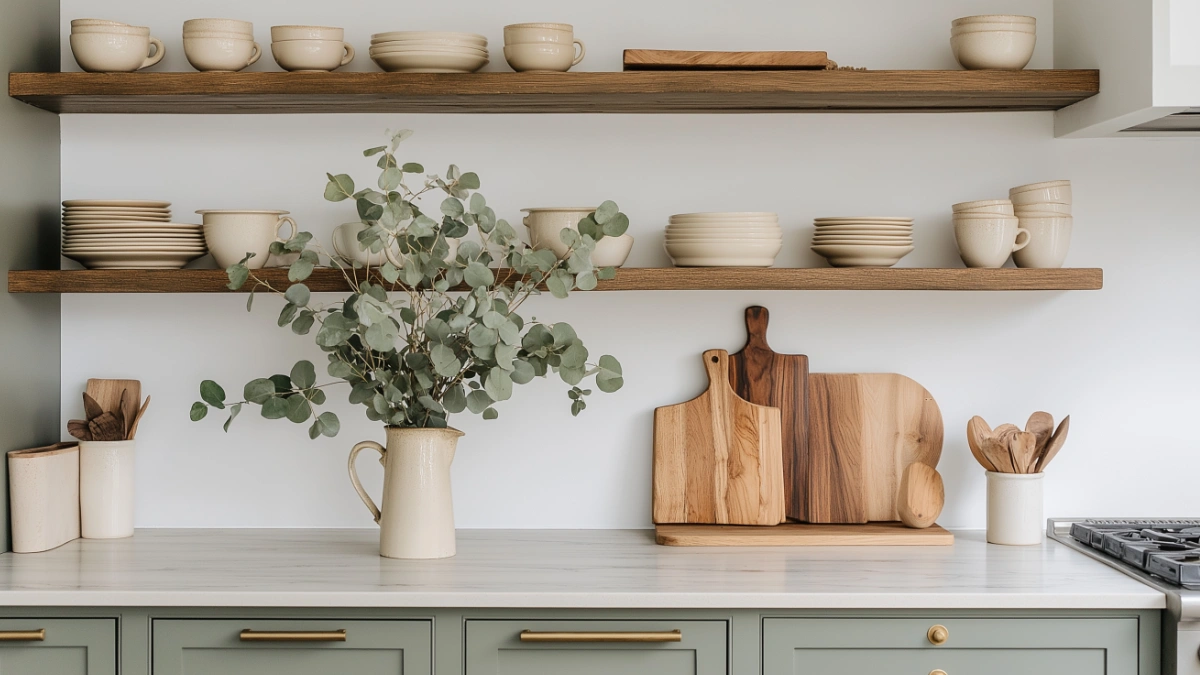Sage Green Kitchen Ideas: Serene and Timeless Designs for a Refreshing Culinary Space
Table of Contents
In an era where homeowners seek calm, grounded interiors, sage green kitchens have emerged as a top design trend. This muted green hue offers the perfect balance between earthy warmth and refreshing elegance. According to recent design studies, searches for “sage green kitchen ideas” have soared, with homeowners and designers alike gravitating toward this calming, nature-inspired color.
But sage green is more than just a passing fad—it’s a timeless choice. Whether you’re renovating a historic cottage or styling a modern open-plan home, sage green introduces tranquility, sophistication, and subtle color into your kitchen. It plays beautifully with a range of design elements: natural wood, brass fixtures, matte black accents, and creamy whites.
In this comprehensive guide, we’ll explore a curated selection of sage green kitchen design ideas. You’ll learn how to pair this versatile hue with different materials, layouts, and decor elements. From cabinetry to tile backsplashes and island styling, every section offers visual inspiration and practical breakdowns to help you bring serene beauty into your culinary space.
Why Choose Sage Green for Your Kitchen?
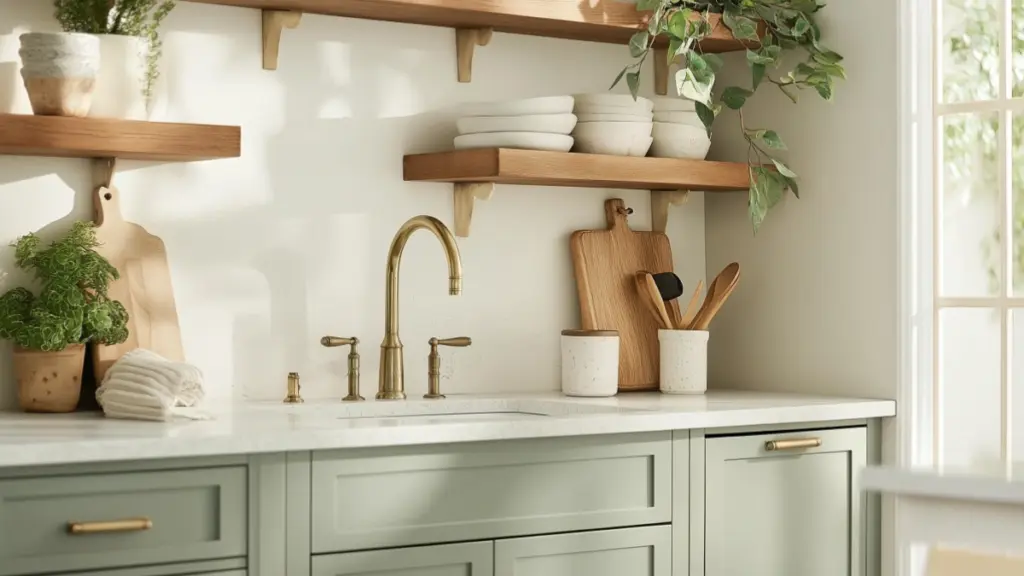
Sage green is a color rooted in nature, and it naturally evokes feelings of calm and cleanliness—both highly desirable in the kitchen. The shade is soft enough to act as a neutral but rich enough to make a statement. It also adapts easily across styles, whether you’re aiming for rustic charm, modern minimalism, or vintage revival.
This versatile hue is also incredibly forgiving in real-life use. Unlike stark white or glossy finishes that show every fingerprint or speck of dust, sage green maintains a fresh look while being practical. It’s also flattering in various lighting conditions, appearing warmer in sunlight and cooler under LED lighting.
Table – Benefits of Using Sage Green in the Kitchen
| Benefit | Why It Works in Kitchens |
|---|---|
| Timeless Appeal | Avoids trend fatigue while staying stylish |
| Easy to Coordinate | Complements wood, brass, white, and black |
| Visually Soothing | Reduces visual clutter and sharp contrasts |
| Works in Any Style | From modern to farmhouse and everything between |
Sage Green Cabinetry: The Foundation of a Tranquil Kitchen
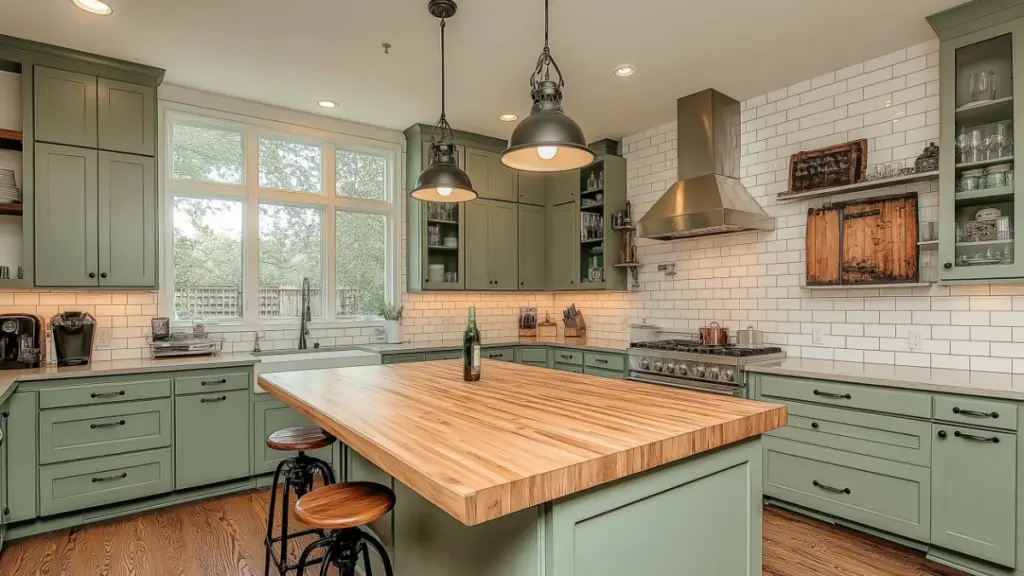
When it comes to sage green kitchens, cabinetry often sets the tone. Full wall-to-wall sage green cabinets create a cohesive and serene look, while sage green lowers combined with white uppers offer a two-tone approach with added lightness.
For a rustic effect, consider shaker-style sage green doors with antique brass knobs. If you prefer something sleek and modern, go for flat-front cabinetry with matte black pulls. In both cases, sage green acts as a grounding element that elevates the overall design.
Table – Sage Green Cabinet Style Options
| Style Type | Best Pairing Material | Visual Impact |
|---|---|---|
| Shaker Style | Butcher block or quartz countertops | Classic, rustic charm |
| Flat-Front Modern | Concrete or marble surfaces | Sleek, minimalist sophistication |
| Beadboard Fronts | Ceramic apron sink, brass accents | Farmhouse-inspired coziness |
| Open Shelf Combo | White uppers with sage lower cabinets | Airy yet grounded layout |
Backsplashes That Complement Sage Green Elegance
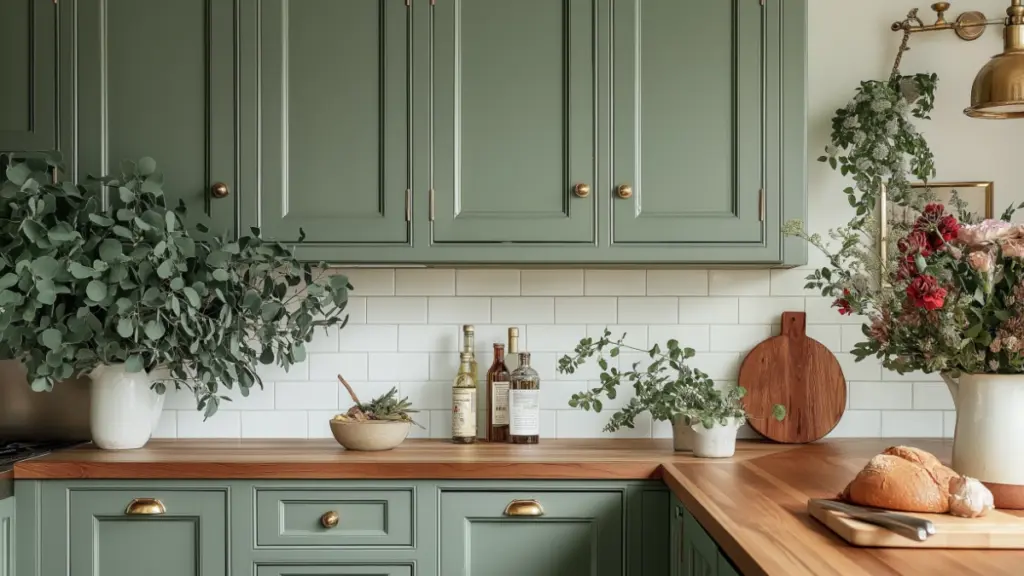
Pairing the right backsplash with sage green cabinetry or walls is essential to maintaining the serene aesthetic. White subway tiles offer a clean and timeless look, while hand-glazed ceramic tiles add texture and artisanal charm. For a modern edge, consider vertical stacking, herringbone patterns, or geometric shapes.
Stone options like marble or quartzite introduce subtle veining that complements the softness of sage green without overpowering it. If you’re drawn to a rustic farmhouse look, terracotta tiles or natural zellige create earthy contrast with a warm finish.
Table – Backsplash Ideas for Sage Green Kitchens
| Backsplash Material | Style Compatibility | Texture & Tone |
|---|---|---|
| White Subway Tile | Modern, traditional, coastal | Crisp, bright |
| Glazed Ceramic | Boho, rustic, cottage | Textured, artisan feel |
| Marble or Quartz Slab | Modern, transitional | Elegant, understated luxury |
| Terracotta Tile | Farmhouse, Tuscan, vintage | Earthy, warm, old-world appeal |
Sage Green and Wood Pairings
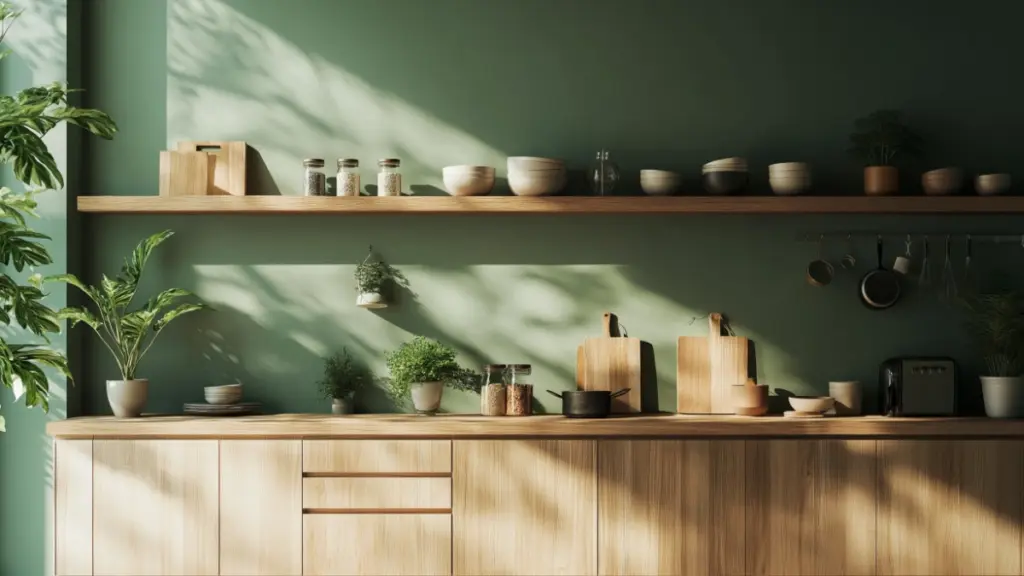
One of the most harmonious combinations in kitchen design is sage green and natural wood. Whether it’s light oak floors or rich walnut countertops, wood enhances the organic essence of sage green while providing warmth and depth.
Lighter woods like white oak or pine keep the space feeling bright and open, ideal for Scandinavian or coastal themes. In contrast, deeper woods like walnut or mahogany add contrast and drama, suiting transitional or heritage-inspired designs.
Open shelving in wood against sage green walls creates a grounded yet visually interesting focal point. Try floating reclaimed shelves styled with neutral ceramics, glass jars, and touches of greenery.
For flooring, wide-plank engineered oak complements sage cabinetry beautifully. If using wood countertops, butcher block offers practicality and character. To keep the look cohesive, repeat wood elements in bar stools, cutting boards, or even ceiling beams.
Table – Sage Green and Wood Pairing Guide
| Wood Tone | Pairing Use | Effect on the Space |
|---|---|---|
| Light Oak | Shelving, floors, accents | Airy, Scandinavian-inspired feel |
| Medium Maple | Countertops, stools, trim | Balanced warmth and approachability |
| Dark Walnut | Cabinet hardware, island top | Rich contrast, high-end style |
| Reclaimed Pine | Open shelves, table | Rustic charm and texture |
The beauty of this pairing lies in its timelessness—never trendy, always inviting.
Accents and Accessories That Elevate the Space
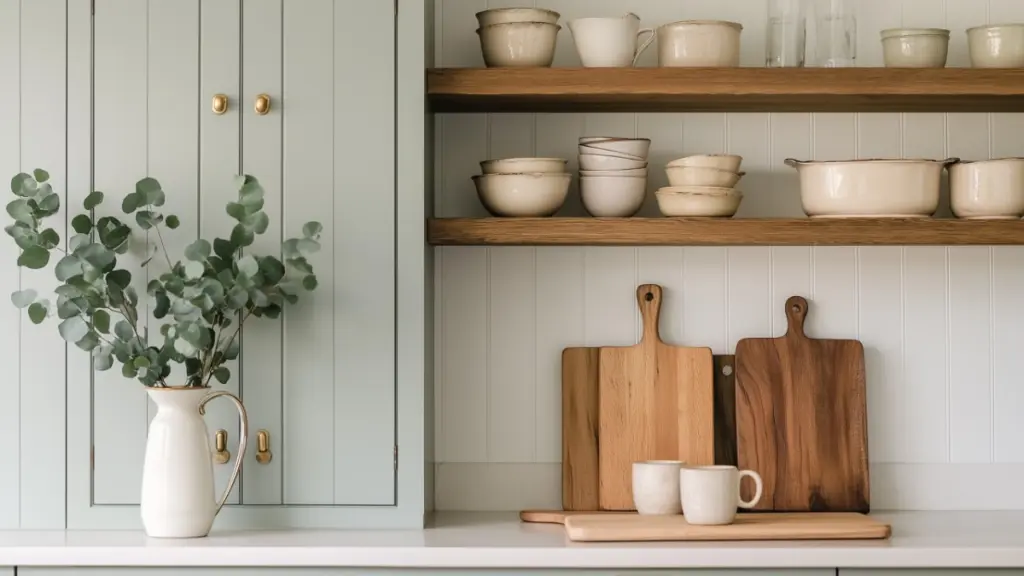
Accessories may be small, but they hold the power to transform a sage green kitchen. Thoughtfully selected finishes, textiles, and everyday objects give the space character and personality without overwhelming the minimalist charm.
Hardware choices are key: brass and aged bronze lend a vintage glow, while matte black offers a modern contrast. Consider mixing metal finishes subtly for visual interest—black sconces with brushed gold cabinet pulls, for example.
Textiles also play a major role. Linen or cotton kitchen curtains, dish towels in soft greys or dusty pinks, and seat cushions in natural fabrics add warmth and softness. Even woven baskets or ceramic trays can enhance the cozy aesthetic while serving functional purposes.
Styling open shelves or countertops? Stick to a restrained palette—white, tan, sage, and natural wood tones. A few sprigs of eucalyptus or dried florals in stone vases create visual calm. Display artisan mugs, cookbooks, or a curated tea collection to reflect your lifestyle.
Table – Accent Details for Sage Green Kitchens
| Accent Type | Recommended Materials | Visual/Functional Benefit |
|---|---|---|
| Cabinet Hardware | Brass, black, aged bronze | Defines cabinetry style |
| Textiles | Linen, cotton, woven blends | Softens space, adds texture |
| Lighting | Pendant lights in rattan or metal | Adds sculptural focal point |
| Accessories | Ceramic vases, wood cutting boards | Functional decor with earthy appeal |
In a sage green kitchen, accessories aren’t clutter—they’re an extension of the palette and mood.
Small Sage Green Kitchens: Maximizing Space Without Losing Style
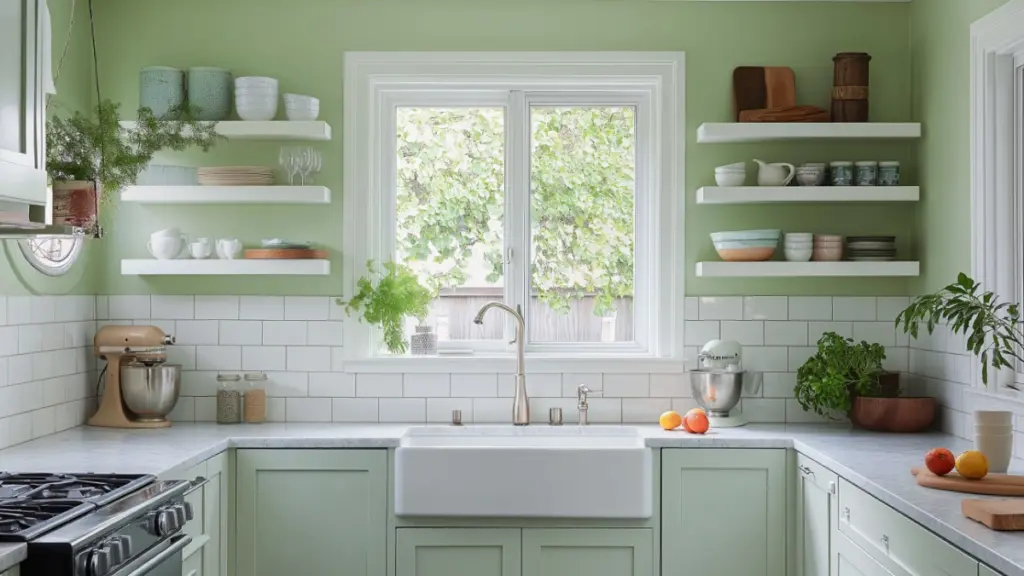
Sage green is surprisingly effective in small kitchen spaces. Because it’s soft and desaturated, it doesn’t overpower compact rooms. It adds color and personality while maintaining the airiness that small kitchens require.
One of the best techniques is to use sage green on the lower cabinetry and keep upper sections white or open. Reflective surfaces—such as glazed tile backsplashes or light stone countertops—amplify light and enhance spaciousness. Slim-profile hardware, integrated lighting, and open shelving help reduce visual bulk.
For galley or L-shaped kitchens, use vertical lines and consistent color blocks to elongate the space. Choose pale flooring, reflective paint finishes, and under-cabinet lighting to create depth and flow.
Table – Small Kitchen Solutions Using Sage Green
| Design Element | How to Use It | Benefit |
|---|---|---|
| Two-Tone Cabinets | Sage lowers, white uppers | Lightens space visually |
| Glazed Backsplash | Reflects light | Adds brightness |
| Floating Shelves | Over closed cabinetry | Reduces visual clutter |
| Compact Hardware | Slim knobs or pulls | Keeps proportions minimal |
Conclusion
Sage green kitchen designs offer a timeless solution for those seeking serenity, warmth, and style. Whether you’re designing a full renovation or making small updates, this versatile hue adapts beautifully to modern, rustic, minimalist, or traditional settings.
By pairing sage green with the right cabinetry, backsplashes, woods, and accessories, you can create a kitchen that feels both grounded and elevated—inviting yet refined. This color isn’t just about aesthetics—it brings nature, calm, and clarity into one of the most used and loved rooms of the home.

